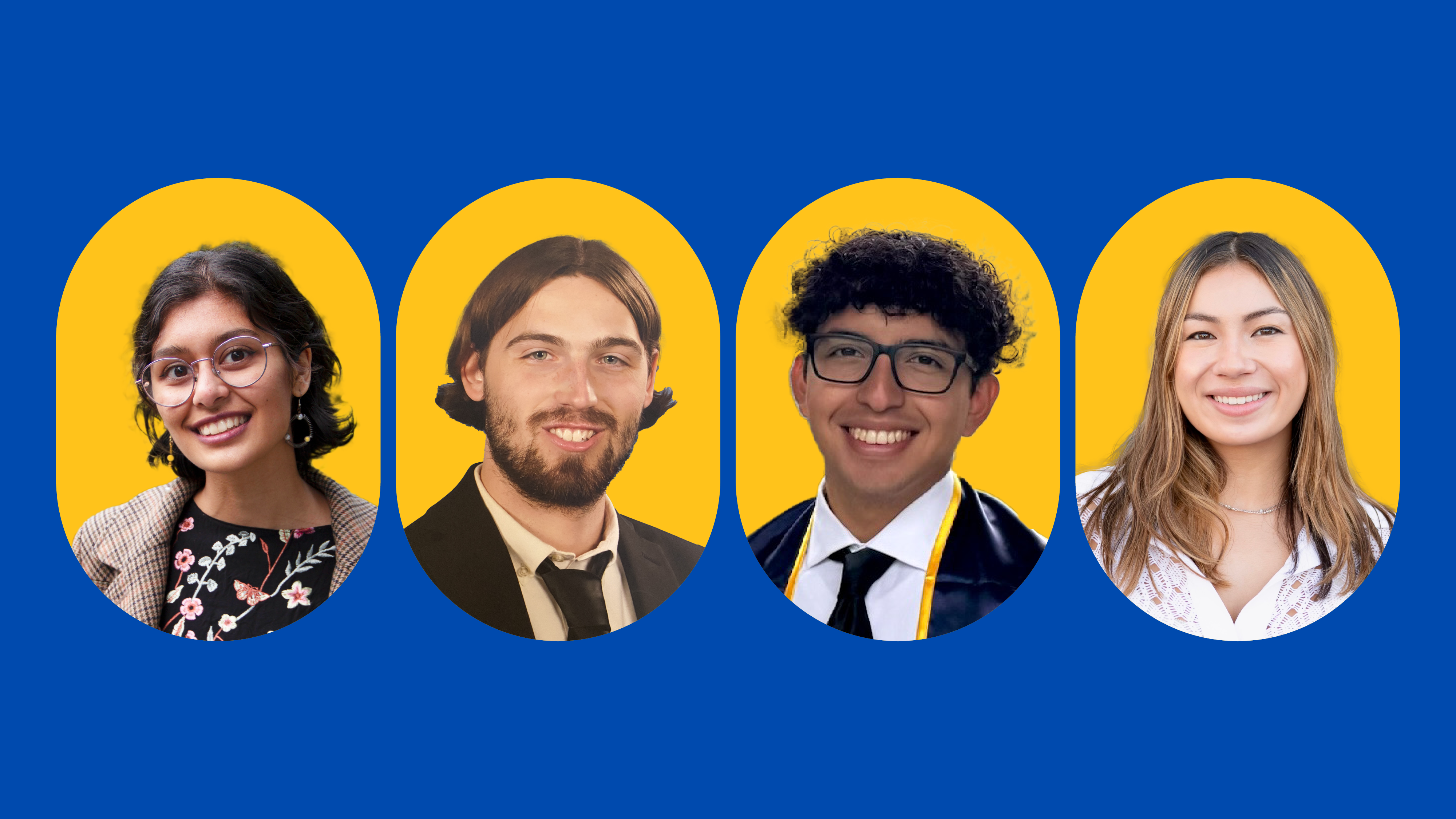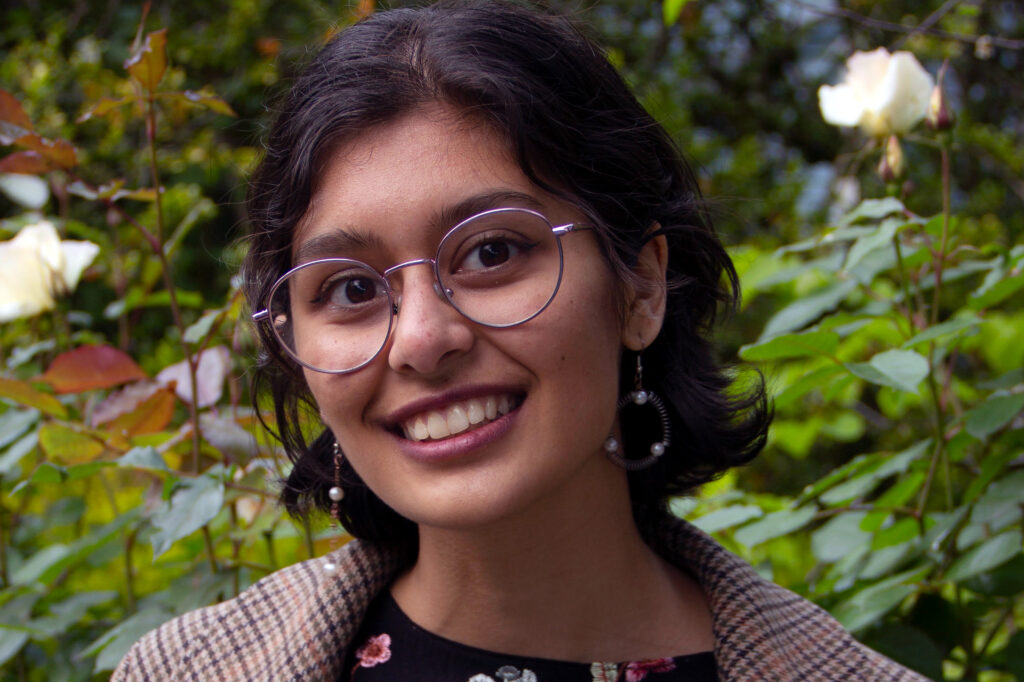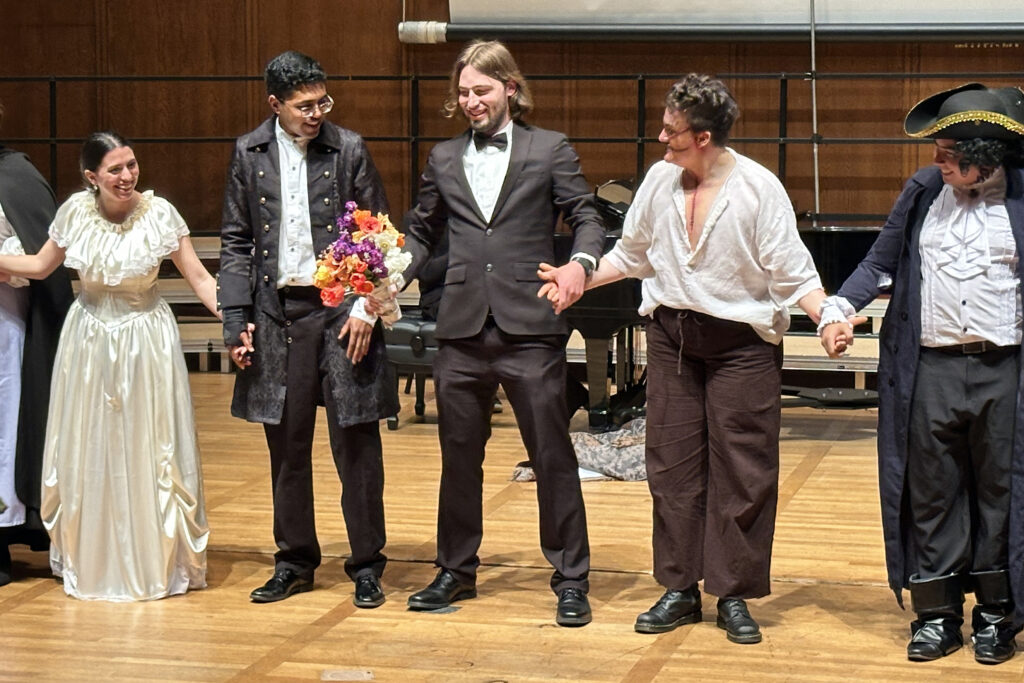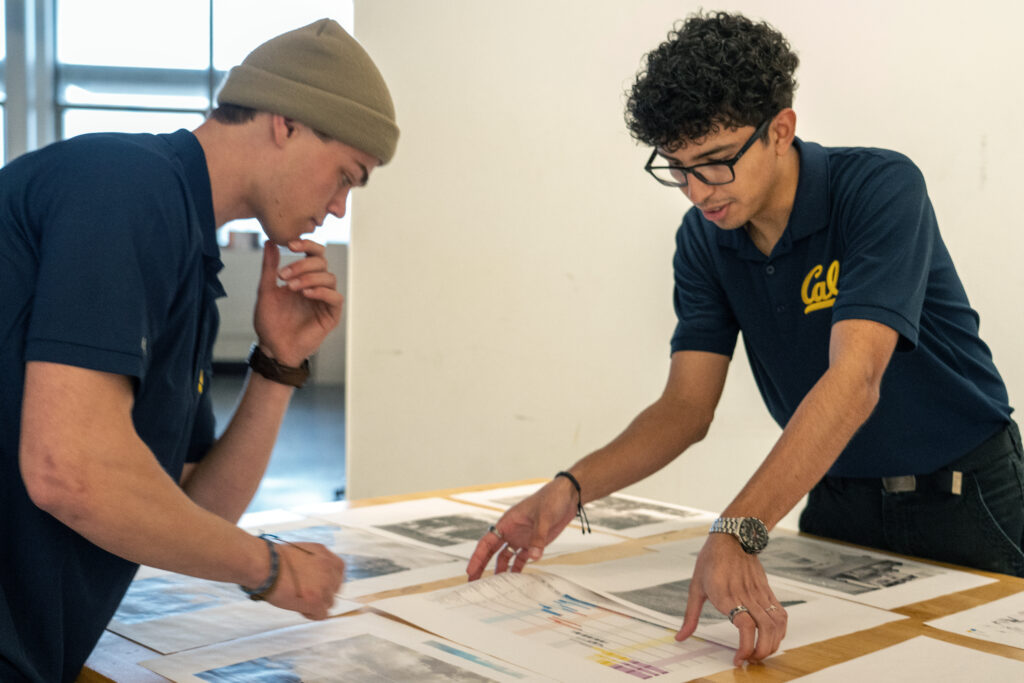In turbulent times, 2025 University Medal finalists excelled through idealism, hard work
Students in the UC Berkeley Class of 2025 worked against a backdrop of historic social and political instability. The University Medal finalists met challenges head-on, and their early accomplishments show the commitment and creative spirit of their class.

Graphic by Neil Freese, UC Berkeley
May 8, 2025
One is a rising star in space research. One is a structural engineer, inspired by the experience of a devastating earthquake. One is a musician and opera composer, and another already has worked at the highest levels of U.S. politics. All share a common commitment: idealism and uncompromising hard work to make a positive impact in the world.
These traits unite the 2025 finalists for the University Medal — Corina Dunn, Owen Klein, Carlos Quezada and Miya Rosenthal — along with this year’s University Medal winner, Asher Cohen.
At a time of extraordinary social and political turbulence in the U.S. and the world, each of them overcame significant challenges and persevered to achieve the highest honors given annually to graduating UC Berkeley seniors.
The University Medal was established 154 years ago, in 1871, three years after the University of California was founded. Candidates must have achieved a GPA of 3.96 or higher while making outstanding extracurricular contributions, engaging in public service and demonstrating innovation and initiative.
This year’s finalists:
Corina Dunn (she/her)

Photo by Johan Vonk
Hometown: Pasadena, CA
Major: Physics
Important extracurricular associations and activities: Research in the Analytis Lab, the UC Berkeley Space Sciences Laboratory, NASA’s Jet Propulsion Laboratory and the campus’s Essig Museum of Entomology. First author of two published scientific papers. Co-facilitator of Physics 98: Introduction to Problem Solving in Physics. MPS (mathematical and physical sciences) Scholars Mentor.
What’s next? Ph.D. in plasma physics at Princeton University, with a focus on turbulence in space or nuclear fusion plasmas.
What has been the biggest challenge you faced at Berkeley? How did you address it?
“There are few women in physics, making it sometimes difficult to feel like I belong and am good enough to succeed. That’s why I work with other undergrads on our Introduction to Problem Solving in Physics DeCal class — we try to welcome new students into physics and help them thrive.”
If you could relive your Berkeley experience, what one thing would you do differently?
“If I were transported back in time, I would first try to understand time travel. More seriously, I always planned to see a concert by the University Baroque Ensemble, but I never managed to. I think in general it would have been good to spend a little more time outside of the Physics Building taking advantage of our lovely campus culture.”
The past several years have featured considerable political and social turbulence — locally, nationally and internationally. Did that influence your experience at Berkeley?
“Recent years have helped me understand that every issue is personal for someone. Having conversations with friends and acquaintances about personal relationships with faith, with gender, the cost of education or the health care system have been deeply impactful to me and have made me a more conscious citizen (and voter). I admire my friends and peers who have consistently made their voices heard, and I will strive to do the same.”
You’ve done remarkably advanced work in space science — ionospheric maps, muon showers, solar wind. But why should the public support such exotic work when it can seem far removed from their day-to-day lives?
“Our day-to-day lives are better when we embrace curiosity and wonder — it’s part of what makes us human that we look for the answers to fundamental questions. Public funding for science ensures that the answers remain open for anyone to learn. In a more practical sense, virtually all modern technologies, from computers to high-yield crops, are based on fundamental science. Science leads to better quality of life.”
Owen Klein (he/him)

Photo courtesy of Owen Klein
Hometown: Oakland, CA
Major: Music, with a minor in history
Important extracurricular associations and activities: Vice president and president, Undergraduate Composers Club (2021-2025); orientation leader and orientation mentor, New Student Services (2022-2024); student representative, Music Undergraduate Committee (2022-2025); composer, librettist and director, Frankenstein, an original opera (2022-2023; 2024-2025); junior member, Phi Beta Kappa Honor Society (2024-present)
What’s next? Work and travel for at least a year before applying to grad school.
What has been the biggest challenge you faced at Berkeley? How did you address it?
“It sounds ridiculous, but my biggest challenge was not having enough time to do everything that I wanted to accomplish. I almost burnt myself out because I tried to complete all of my coursework while composing an opera during my ‘free’ time. Fortunately, I stayed focused, and it paid off!”
If you could relive your Berkeley experience, what one thing would you do differently?
“I would try to relax a little bit and spend more time with my friends and family. For better or worse, my academics and extracurriculars have dominated my experience, and I haven’t had as much time for the people who matter most in my life. That being said, I hope to continue searching for the right balance in the years ahead.”
The past several years have featured considerable political and social turbulence — locally, nationally and internationally. Did that influence your experience at Berkeley?
“During my four years at Cal, I’ve monitored events around the world with great interest and concern. I’m grateful for the critical thinking and leadership skills that I’ve developed and, as I go forward in life, I intend to continue my advocacy for justice, equality and democracy.”
You were the composer, director and librettist for an original opera — Frankenstein. Tell us a bit more: Why that famous story? How did it feel to see such a complex creation come to life on stage?
“After winning the Musical Theater Prize in the music department during my freshman year, I began the nearly impossible task of producing an original opera based on Frankenstein by Mary Shelley. I was drawn to the story of Frankenstein because it is significantly more complex than most adaptations make it seem, especially considering the moral ambiguity of the monster. The 2023 and 2025 performances of my opera have been the highlights of my undergraduate experience!”
Carlos Quezada

Photo by Nicholas Pham
Hometown: San Salvador, El Salvador
Major: Civil engineering, Berkeley certificate in design innovation
Important extracurricular associations and activities: President of Tau Beta Pi, the National Engineering Honor Society; researcher at Berkeley’s Structures Lab, working to enhance concrete performance and long-term durability; project manager in Cal Construction’s Design-Build competition team; Regents’ and Chancellor’s Scholars Association.
What’s next? Master’s degree studies in structural engineering, mechanics and materials at Berkeley, focusing on earthquake engineering and seismic-resistant design and analysis.
What has been the biggest challenge you faced at Berkeley? How did you address it?
“Having started high school with just 30 classmates, I found Berkeley’s size overwhelming at first. It was easy to feel invisible. But by joining clubs that reflected my interests, culture and background, I found spaces where I felt seen, supported and surrounded by others who inspired me to reshape my path.”
If you could relive your Berkeley experience, what one thing would you do differently?
“I would remind myself more often just how rare and special it is to be a part of Berkeley. Immersed in such an inspiring environment, it was easy to get caught up in the day-to-day challenges and lose sight of the bigger picture. I wish I had paused more often to fully appreciate the brilliance surrounding me — the distinguished faculty, world-changing ideas, my talented peers and the historic halls I was lucky enough to walk through.”
What inspired your career interest in engineering and structural engineering?
“I was a teenager in El Salvador when a 7.3-magnitude earthquake struck, collapsing homes and even my neighborhood’s elementary school. I vividly remember driving with my parents, looking out the window at houses reduced to rubble, wondering why some buildings failed while others stood. That question stayed with me for years and ultimately led me to Berkeley, where I could find those answers and learn to protect communities like the one I grew up in.”
In your University Medal essay, you used a beautiful metaphor: engineering as a way of “strengthening the foundations, both structural and social, that support us all.” What does that suggest for your future in engineering?
“Strengthening foundations means more than just designing structures — it means building pathways for others to rise. As a Latino and first-generation student, I realized how critical support networks are in shaping confidence and resilience. In my career, beyond designing structures, I hope to help create spaces where underrepresented young engineers feel motivated, supported and empowered. I want to use the opportunities I’ve been given to open doors for those who come behind me, whose dreams deserve to be realized.”
Miya Rosenthal (she/her)

Photo by Stacy Choi
Hometown: Los Angeles, CA
Major: Media studies, with a minor in public policy
Important extracurricular associations and activities: Research assistant at former U.S. Labor Secretary Robert Reich’s Inequality Media nonprofit; editor-in-chief at Policy Review @ Berkeley; committee head chair at Berkeley Model United Nations; student instructor at the Goldman School of Public Policy and in the political science department; Chi Omega sorority; intramural soccer.
What’s next? Continuing with Inequality Media, including the premiere of “The Last Class” documentary; interning this summer at the United Nations headquarters in New York City; turning 21; beginning master’s degree studies in comparative social policy at the University of Oxford.
What has been the biggest challenge you faced at Berkeley? How did you address it?
“Balance. Last fall, I juggled three jobs — including crisscrossing the nation for Kamala Harris’ presidential campaign — teaching, grad school applications, a half-marathon, recovering from a near-fatal crash at Buttonwillow Raceway and savoring my final semester before graduating early. It was only possible with support from friends, family, professors and supervisors (and plenty of caffeine).”
If you could relive your Berkeley experience, what one thing would you do differently?
“I would buy an umbrella. My freshman roommate from Seattle convinced me I didn’t need one. But I’m from LA — I needed one. I spent my time at Cal perpetually damp and often sick. As I head off to the rainy UK this fall, I’ll invest in a proper umbrella!”
The past several years have featured considerable political and social turbulence — locally, nationally and internationally. Did that influence your experience at Berkeley?
“Absolutely. I came to Berkeley for its culture of civic engagement, and recent years did not disappoint. Students make their voices heard inside and outside of the classroom. I was challenged daily to consider views beyond my own. In this discomfort, I developed three habits of citizenship: assume sincerity, separate motives from outcomes and cultivate big-tent humanity. Progress is staggered, contradictory and incomplete, so we owe ourselves and each other humility in its pursuit.”
You’ve had extraordinary high-level experience in national politics. What’s your short-form assessment of the state of U.S. democracy? How can we fix it?
“Democracy is fragile. I inherit cautionary legacies — WWII Jewish persecution and Japanese-American incarceration — which echo as civil liberties again come under siege. Short term: Defend the rule of law, safeguard elections, expose disinformation, confront bigotry, fight corruption and hold power accountable under the Constitution. Long term: Get big money out of politics. Long, long term: Democratize counter-majoritarian structures with fair, proportional representation, among other reforms. I’ll devote my career to restoring our wavering democracy and improving it.”